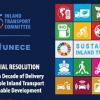Press Releases
Displaying Results 1 - 15 of 15
In the declaration issued following their latest meeting in Milan, G7 transport ministers have recognized the role of UNECE in advancing sustainable low-carbon mobility. In particular, they welcomed the recently adopted UNECE Strategy on Reducing Greenhouse Gas Emissions from Inland Transport,
The global transport sector has the highest reliance on fossil fuels of any sector. In 2021 it accounted for almost one fourth of global greenhouse gas (GHG) emissions. The road transport sector, including passenger cars, buses, heavy and light duty commercial vehicles, is the major GHG contributor
Cargo carriage by rail between Europe and Asia will be made easier, quicker and thus cheaper thanks to the adoption of a new United Nations Convention unifying applicable legal rules.
Until now, rail transport of goods from Asia to Europe was not covered by one uniform legislative system,
UNECE’s Inland Transport Committee (ITC) today adopted the Model Rules on the Permanent Identification of Railway Rolling Stock, which will facilitate the financing and acquisition of railway rolling stock leading to a reduced cost for those wishing to invest in the railways.
As the 60th legal
Today as part of the annual session of UNECE's Inland Transport Committee (ITC), ministers from around the world adopted a Ministerial Declaration that calls for harnessing the full potential of inland transport solutions in the global fight against climate change. The declaration will give
The 75th anniversary session of the Inland Transport Committee (ITC) concluded at the United Nations Economic Commission for Europe (UNECE), after a week of forward progress in the fields of inland transport connectivity, road safety, accessibility, and sustainability.
Among the week’s
Some 50 transport ministers and leaders from around the world joined delegates from over 90 countries for the 75th anniversary session of UNECE’s Inland Transport Committee (ITC) to celebrate its unique accomplishments and depict a picture of the Committee’s future.
In her keynote address, Ms.
The 8th Edition of the Global Road Safety Film Festival, to be held on 21-22 February 2022, will showcase the best films from among submissions from over 40 countries worldwide that highlight smart and safe mobility solutions to the road safety crisis.
The Festival’s focus on smart and safe
The number of accidents involving trucks and coaches on the road could soon be reduced with the extension of the use of Advanced Emergency Braking System (AEBS). Initially designed to improve safety on motorways, the scope of UN Regulation No. 131 will be widened to include other road contexts,
The launch of the Decade of Action for Road Safety 2021-2030 sets the ambitious target of preventing at least 50% of road traffic deaths and injuries by 2030. To realize this vision, UNECE partnered with WHO and its sister UN Regional Commissions to develop a Global Plan for the Decade of Action,
The digitalization of the “carnet de passages en douane” – or “CPD” system –, which facilitates the temporary importation of private and commercial vehicles, is expected to greatly improve its efficiency, speed and transparency. Through enhanced data management, the digitalized “eCPD” system will
Recognizing the vital importance of mobility and connectivity for sustainable economic development and taking stock of key challenges, UNECE has consolidated its work in this cross-cutting area to help countries leverage its tools to steer recovery efforts towards the Sustainable Development Goals
Intelligent Transport Systems can unlock major benefits in terms of safety, efficiency and environmental performance for mobility and the movement of goods. But with the rapid pace of innovation, ensuring interoperability and harmonization of technological solutions between countries remains a key
Transport leaders from around the world have called for urgent and concerted action to address systemic vulnerabilities exposed by the COVID-19 pandemic, which caused widespread disruption to transport connectivity and supply chains. Gathering for the 83rd session of the UNECE Inland Transport
Automation in transport, including “self-driving” autonomous vehicles, has the potential to improve the lives of billions of people and transform mobility as we know it. It could enable a safer, more efficient, accessible and ecological means of transport. It could also ultimately save billions of















